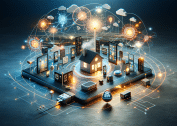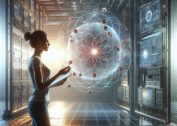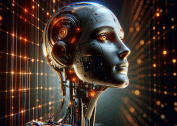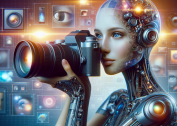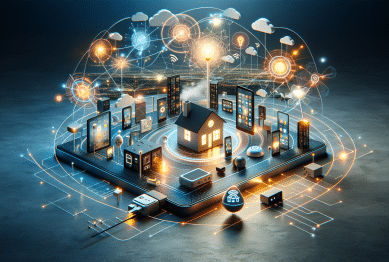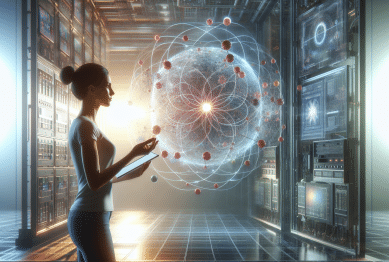Artificial intelligence in daily life is shaping modern living in surprising ways. This article reveals how AI tools influence work, entertainment, health, and our digital choices. You will also learn about practical examples and new trends in technology and science.
The Rise of Artificial Intelligence in Daily Routines
Artificial intelligence tools have quietly integrated into daily life, often without much notice. Voice assistants set reminders, smart thermostats adjust home temperatures, and streaming apps suggest personalized playlists. In fact, artificial intelligence in daily life often runs silently in the background, optimizing routines without effort from users.
For example, algorithms can recommend recipes from fridge contents, suggest faster commute routes, or track sleep for better health. Moreover, smart fridges, energy meters, and robot vacuums show how AI creates efficiency in the home.
However, convenience comes with challenges. Data security and privacy remain pressing concerns as these systems collect personal information. Therefore, balancing efficiency with safe digital practices is essential.
AI at Work: Productivity and Innovation
In the workplace, artificial intelligence in daily life is reshaping productivity. Project management software forecasts deadlines, allocates resources, and reduces risks. Meeting assistants transcribe conversations and generate summaries automatically.
Furthermore, AI enables customer service chatbots to provide 24/7 support, while data analytics platforms reveal insights from massive datasets in seconds. As a result, companies adapt quickly to new trends, improve efficiency, and free employees for creative and strategic work.
Personalized Experiences: Entertainment, Shopping, and Content Discovery
Personalization is one of AI’s most captivating contributions to digital life. Whether browsing for a new book or queuing up a weekend playlist, AI algorithms tailor suggestions by sifting through vast amounts of behavioral data. For entertainment platforms, this means movie and TV show recommendations closely align with viewing habits, surprising users with hidden gems. Music streaming services curate daily mixes, learning from individual preferences and even mood signals inferred from listening patterns. This smart curation helps users navigate overwhelming content libraries, ensuring entertainment feels engaging and deeply relevant.
The impact goes far beyond streaming media. E-commerce giants deploy AI to deliver targeted product suggestions based on browsing trends, wish lists, or seasonal preferences. These recommendations enhance discovery and create a feeling of intuitive shopping, often uncovering products users didn’t know they needed. Dynamic pricing strategies powered by machine learning ensure prices reflect demand, inventory, or external factors, although this can raise questions around transparency. Social media platforms employ AI to surface posts and ads most likely to engage specific users, though this has sparked broader debate about the ethical use of algorithms in shaping online experience.
Augmented reality (AR) and virtual reality (VR) technologies further showcase AI’s influence in entertainment and shopping. Personalized avatars, interactive try-on experiences, and AI-generated content create immersive environments for learning, playing, and buying. AI suggests new creators to follow, trends to explore, and even news stories tailored to personal interests. As the algorithms grow more sophisticated, there’s a growing conversation regarding content diversity, filter bubbles, and the balance between convenience and serendipity. Users are encouraged to remain aware and seek variety, ensuring their digital journeys remain fresh and enriching.
AI’s Role in Healthcare: Smarter Monitoring and Early Detection
The implementation of artificial intelligence in healthcare has begun to redefine patient experiences and outcomes. Remote monitoring devices, powered by AI, now track vital signs and instantly flag irregularities, offering the potential for earlier interventions. Algorithms process data from wearable sensors, predicting everything from sleep apnea to cardiac anomalies. Medical imaging leverages deep learning to spot subtle patterns in scans, sometimes outperforming human analysis in accuracy. This continuous monitoring and swift assessment can be especially valuable for detecting changes before symptoms worsen, underlining AI’s value for preventive care.
The COVID-19 pandemic accelerated the adoption of telehealth and AI-driven diagnostics. Chatbots screen symptoms, virtual appointments replace office visits, and AI triages patient concerns, directing individuals to proper resources efficiently. Natural language processing enables AI systems to extract relevant medical history from unstructured notes, improving care coordination. In research, AI models analyze diverse datasets to identify new drug prospects and predict disease outbreaks. These advancements enhance the reach of care, especially for remote or underserved populations, strengthening the healthcare system’s ability to respond rapidly to public health challenges.
Despite the benefits, ethical considerations abound. Patient data privacy, algorithmic transparency, and unbiased model training remain paramount concerns in medical AI adoption. Health institutions partner with AI vendors to create secure, privacy-preserving infrastructures. Regulatory agencies actively publish guidelines to ensure that AI tools in healthcare enhance safety without replacing qualified professionals. When applied thoughtfully and with oversight, AI is set to play a transformative role in personalized care, clinical decision support, and global health management. Ongoing collaboration between researchers, clinicians, and technology developers will help ensure these systems remain trustworthy and effective.
The Science Behind AI: Data, Algorithms, and Ethics
Artificial intelligence functions through a combination of data collection, model training, and sophisticated algorithms. The heart of AI is its ability to learn from data—sometimes labeled, sometimes not—and discern patterns far beyond human cognitive capacity. Deep learning, a subset of machine learning, employs interconnected neural networks that mimic the brain’s structure to analyze information at scale. With each interaction, these networks improve, enabling AI to refine its predictions or actions continually. Access to high-quality and diverse datasets remains crucial for effective training and real-world performance.
While algorithmic efficiency drives innovation, it also raises pointed questions about transparency, reproducibility, and fairness. Models designed without representative datasets can encode societal biases, inadvertently perpetuating discrimination. Therefore, researchers and developers adhere to rigorous data preparation, ongoing evaluation, and bias detection protocols. Recent years have seen the rise of explainable AI—a movement toward creating models that not only deliver results but also offer understandable insights into decision-making. Diverse teams and interdisciplinary research continue to contribute important perspectives, ensuring that AI development supports fairness and inclusion.
Ethics form the backbone of responsible AI deployment. Institutions develop AI ethics guidelines, addressing potential misuse, consent, and harmful consequences. Regulatory agencies propose frameworks requiring organizations to audit algorithms, monitor their impact, and provide recourse for affected users. Citizens and experts alike are invited to participate in conversations about the societal implications of AI, ensuring technology aligns with collective values. As AI advances, the balance between innovation and accountability will shape its trajectory, fostering a future where technology remains a valuable asset to all.
Preparing for the Future: Skills, Careers, and Lifelong Learning
The proliferation of artificial intelligence across sectors underscores the growing need for digital literacy and adaptability. Educational institutions are updating curricula to include AI concepts, coding, and data science. Free online courses, offered by industry leaders, universities, and government agencies, enable learners of all backgrounds to upskill and stay current. Familiarity with basic AI principles becomes as valuable as traditional computer knowledge, fostering resilience in changing job landscapes. Professional organizations encourage hands-on experimentation with AI tools—exploring everything from basic chatbots to advanced data analytics software.
Career fields are evolving alongside AI development. Demand is increasing for data scientists, machine learning engineers, AI ethicists, and user experience designers. Existing roles, from marketing to healthcare, are also being reshaped by intelligent automation and analytics. Individuals who cultivate critical thinking, collaboration, and ethical awareness will find their skills complemented—rather than replaced—by technology. Businesses support internal reskilling programs to maintain competitive advantage and keep employee skillsets aligned with future needs. The job market is becoming a collaborative environment, where humans and AI augment one another’s strengths.
Lifelong learning ensures a continuous cycle of growth amid rapid technological change. Online platforms provide interactive training and mentoring for beginners and experts alike. Open-source communities, competitions, and hackathons foster peer-to-peer learning about artificial intelligence tools. Government and nonprofit initiatives work to expand AI literacy in underserved communities, democratizing access to cutting-edge knowledge. By embracing curiosity and seeking new challenges, individuals and organizations prepare to thrive in the AI-powered future—where imagination, empathy, and adaptability shine brightest.
References
1. National Institute of Standards and Technology. (2023). Artificial Intelligence at Home and Work. Retrieved from https://www.nist.gov/artificial-intelligence
2. U.S. Department of Energy. (2023). The Future of Smart Homes. Retrieved from https://www.energy.gov/eere/buildings/articles/future-smart-homes
3. U.S. Food & Drug Administration. (2023). Artificial Intelligence and Machine Learning in Software. Retrieved from https://www.fda.gov/medical-devices/software-medical-device-samd/artificial-intelligence-and-machine-learning-software-medical-device
4. Stanford University Human-Centered Artificial Intelligence. (2022). AI Index Report. Retrieved from https://hai.stanford.edu/research/ai-index-2022
5. Harvard University Berkman Klein Center. (2022). Principles for Ethical AI. Retrieved from https://cyber.harvard.edu/publication/2022/principles-ethical-ai
6. National Institutes of Health. (2022). Using Artificial Intelligence in Health Care. Retrieved from https://www.nih.gov/news-events/nih-research-matters/using-artificial-intelligence-health-care

